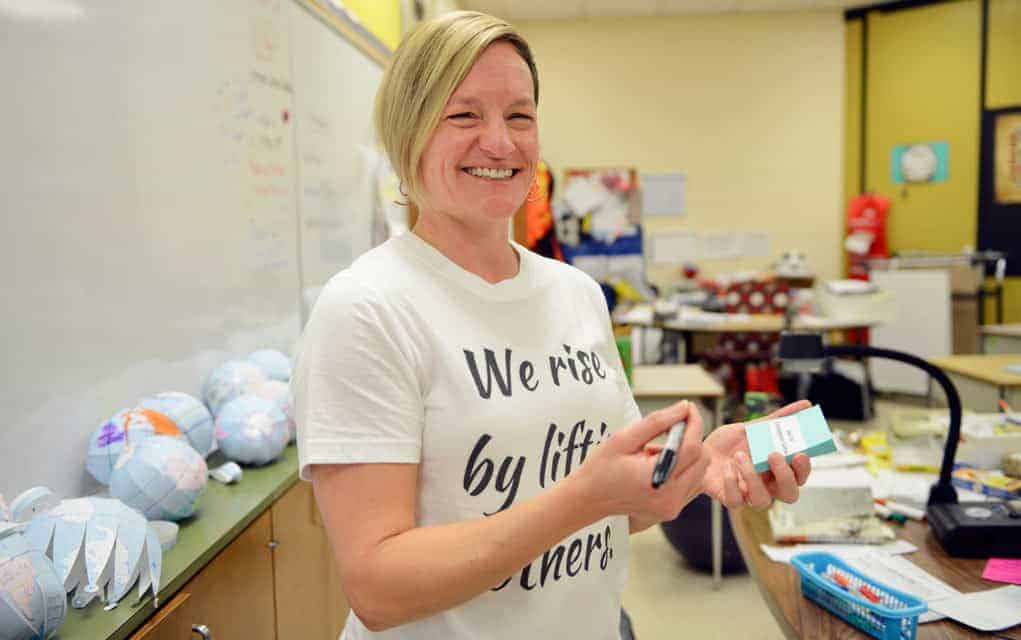Park Manor Senior Public School in Elmira kicked off national bullying prevention week with the official start of their involvement in the Compassion Games.
Inspired by a video that spoke about the power the Compassion Games have had in both schools and penitentiaries in the United States, staff decided it would be a way to recognize and in turn further promote acts of kindness within the school.
“It became this big thing that people just wanted to be good to each other – so that’s kind of our hope. We would like to make students a little bit more aware of their actions and acknowledge them for their acts of kindness,” said Tanya Weissenboeck, one of the staff members behind the campaign.
Known as a community engagement experience, the Compassion Games: Survival of the Kindest began as a playful exchange between the cities of Seattle and Louisville on who was the most compassionate city in the world. Offering a way to ignite compassionate actions in communities worldwide, since 2012 more than five million people have participated in the games. Participants in the sanctioned games are asked to perform acts of kindness and then report and reflect on their activities and outcomes.
“Having children or adults feel empowered to assist when they witness a negative situation, that has the largest impact at curtailing bullying so the concept of Compassion Games is to promote and acknowledge when people are being aware of their peers and naturally doing good things,” explained Sharlene McHolm, principal at Park Manor. “We just want an inclusive and supportive learning environment.”
For the remainder of the school year, students who perform kind actions will be recognized and have their names entered into a draw where one student will be chosen each month and given a gift card to keep, pass on or donate to charity.
Rather than just promoting small actions, Weissenboeck hopes the games will promote a mind shift in students.
“We are hoping that in the end it will become something much more that we can sort of grow a community of compassion and take things beyond the school, into Elmira and perhaps beyond,” she said. “Getting them to pause and think before those words come out think of a better way to say it and also just in the way that they interact.”
One thing the teacher wanted to drive home is the idea that any form of compassion to others begins with self-compassion.
“If you can’t be kind to yourself it is really hard to be kind to others, beginning with the positive self-talk and being able to build themselves up to be confident enough to build others up,” said Weissenboeck.
“We see so many negative behaviours, not just in school but outside as we become adults. If we can develop a better sense of awareness and a more positive self-talk, positive self-confidence, then I think that will build everything and it will go from there.”
Incorporating the games into the school atmosphere goes hand in hand with the school board’s shift to focus on the mindfulness of students.
“We are not just focused on math. We are not just focused on literacy, but we are focused really on the whole child, and it is not just the academics. We know that if children aren’t confident and compassionate to themselves they can’t really learn, if you are always putting yourself down saying things like, ‘I am stupid’ or ‘I can’t do that’ they aren’t really going to be able to achieve academic success without that self-compassion,” said Weissenboeck.
For the principal of the school, the concept of the games is less about the actions themselves but about the overall atmosphere she hopes recognizing students will promote.
“We have great kids here. I would say that we have some of the best kids in the province, so they naturally are kind and compassionate, they naturally want to help others. What this does for us is to help us to focus on all of those positive little actions that kids are doing and people are doing every day and just finding a small way to acknowledge that,” she said.
While the games are being started within school grounds, the hope is that these students actions will in turn leak out into the community.
“We would like students to become intrinsically motivated so they aren’t driven just for the reward of that gift card but that they will take it beyond and that perhaps we will see interactions with younger students or the elderly or just everyone in general in the community,” said Weissenboeck.









